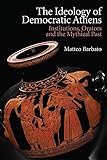The Ideology of Democratic Athens : Institutions, Orators and the Mythical Past / Matteo Barbato.
Material type: TextSeries: New Approaches to Ancient Greek Institutional History : NAAGIHPublisher: Edinburgh : Edinburgh University Press, [2022]Copyright date: ©2020Description: 1 online resource (264 p.) : 10 B/W illustrationsContent type:
TextSeries: New Approaches to Ancient Greek Institutional History : NAAGIHPublisher: Edinburgh : Edinburgh University Press, [2022]Copyright date: ©2020Description: 1 online resource (264 p.) : 10 B/W illustrationsContent type: - 9781474466448
- 320.9385 23
- JC75.D36 B37 2020
- online - DeGruyter
| Item type | Current library | Call number | URL | Status | Notes | Barcode | |
|---|---|---|---|---|---|---|---|
 eBook
eBook
|
Biblioteca "Angelicum" Pont. Univ. S.Tommaso d'Aquino Nuvola online | online - DeGruyter (Browse shelf(Opens below)) | Online access | Not for loan (Accesso limitato) | Accesso per gli utenti autorizzati / Access for authorized users | (dgr)9781474466448 |
Browsing Biblioteca "Angelicum" Pont. Univ. S.Tommaso d'Aquino shelves, Shelving location: Nuvola online Close shelf browser (Hides shelf browser)

|

|

|

|

|

|

|
||
| online - DeGruyter George Strachan of the Mearns : Sixteenth Century Orientalist / | online - DeGruyter Local Legitimacy and International Peacebuilding / | online - DeGruyter Cognitive Bias in Intelligence Analysis : Testing the Analysis of Competing Hypotheses Method / | online - DeGruyter The Ideology of Democratic Athens : Institutions, Orators and the Mythical Past / | online - DeGruyter ReFocus : The Films of Rachid Bouchareb / | online - DeGruyter Lucretius II : An Ethics of Motion / | online - DeGruyter Deleuze in Children's Literature / |
Frontmatter -- Contents -- List of Tables and Illustrations -- Preface -- Abbreviations -- Chapter 1 Introduction -- Chapter 2 Myth and Athenian Democracy -- Chapter 3 The Discursive Parameters of Athenian Democratic Institutions -- Chapter 4 Exclusiveness and Eugeneia in the Myth of Autochthony -- Chapter 5 Between Charis and Philanthrōpia: The Heraclidae -- Chapter 6 Fading Shades of Hybris: The Attic Amazonomachy -- Chapter 7 Combining Hybris and Philanthrōpia: The Myth of Adrastus -- Chapter 8 Conclusions -- Bibliography -- Index Locorum -- General Index
restricted access online access with authorization star
http://purl.org/coar/access_right/c_16ec
Investigates the construction of democratic ideology in Classical Athens through a study of the social memory of Athens’ mythical pastProposes a novel approach to Athenian democratic ideology that opens new frontiers of investigation in ancient history and the social sciencesThe introduction clearly sets out the aims and methodology of the book and its place within the scholarship in ancient history and the social sciencesFour case studies illuminate the impact of Athenian democratic institutions on ideology, myth, and the use of social memoryOffers a long-awaited new interpretation of the Athenian funeral oration for the war deadOffers clear overviews of Athenian democratic institutions (e.g., Assembly, Council, lawcourts) based on the most recent scholarshipProvides up-to-date overviews of several values in Greek thought (e.g., charis, hybris, eugeneia)The debate on Athenian democratic ideology has long been polarised around two extremes. A Marxist tradition views ideology as a cover-up for Athens’ internal divisions. Another tradition, sometimes referred to as culturalist, interprets it neutrally as the fixed set of ideas shared by the members of the Athenian community. Matteo Barbato addresses this dichotomy by providing a unitary approach to Athenian democratic ideology. Analysing four different myths from the perspective of the New Institutionalism, he demonstrates that Athenian democratic ideology was a fluid set of ideas, values and beliefs shared by the Athenians as a result of a constant ideological practice influenced by the institutions of the democracy. He shows that this process entailed the active participation of both the mass and the elite and enabled the Athenians to produce multiple and compatible ideas about their community and its mythical past.
Mode of access: Internet via World Wide Web.
In English.
Description based on online resource; title from PDF title page (publisher's Web site, viewed 29. Jun 2022)


